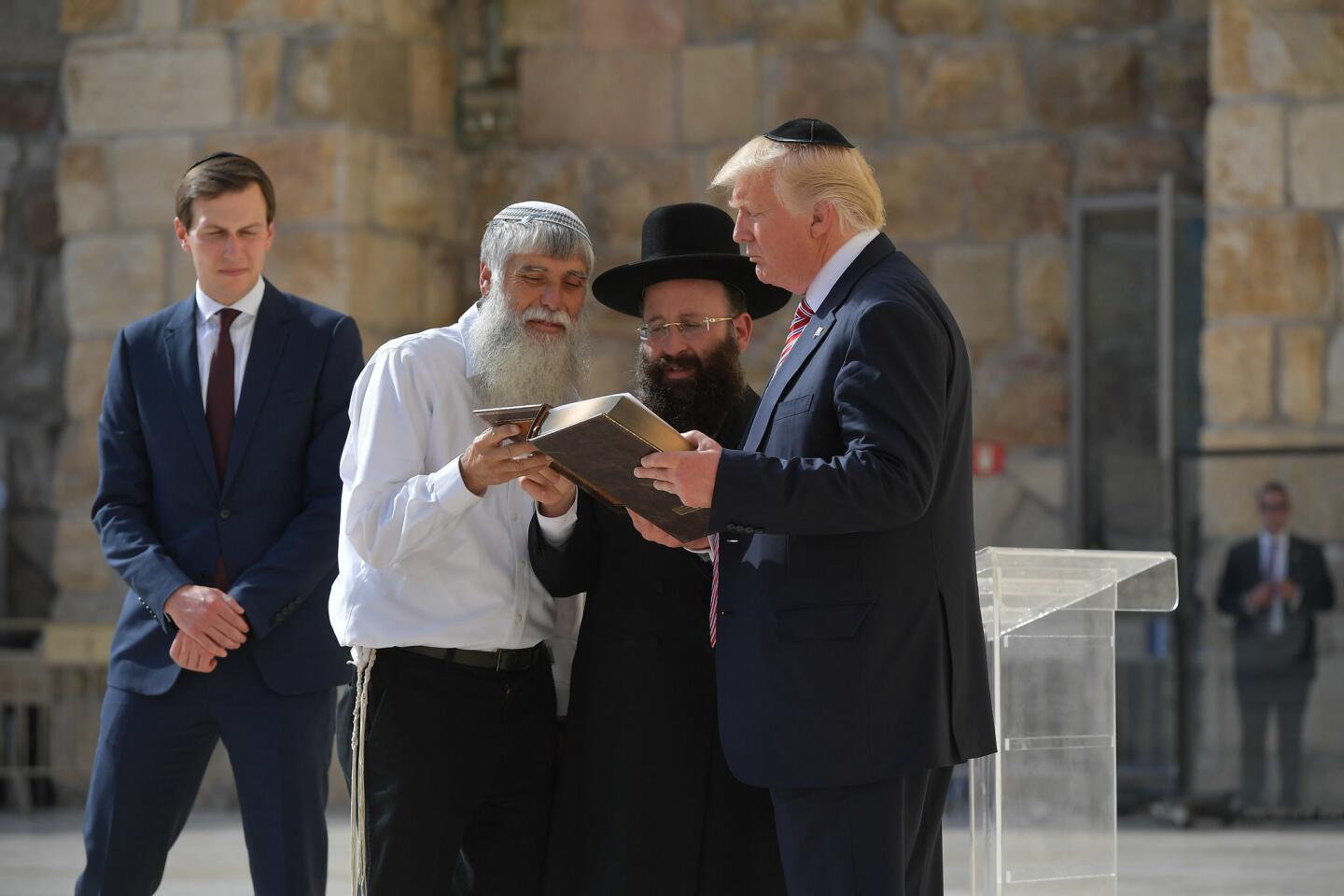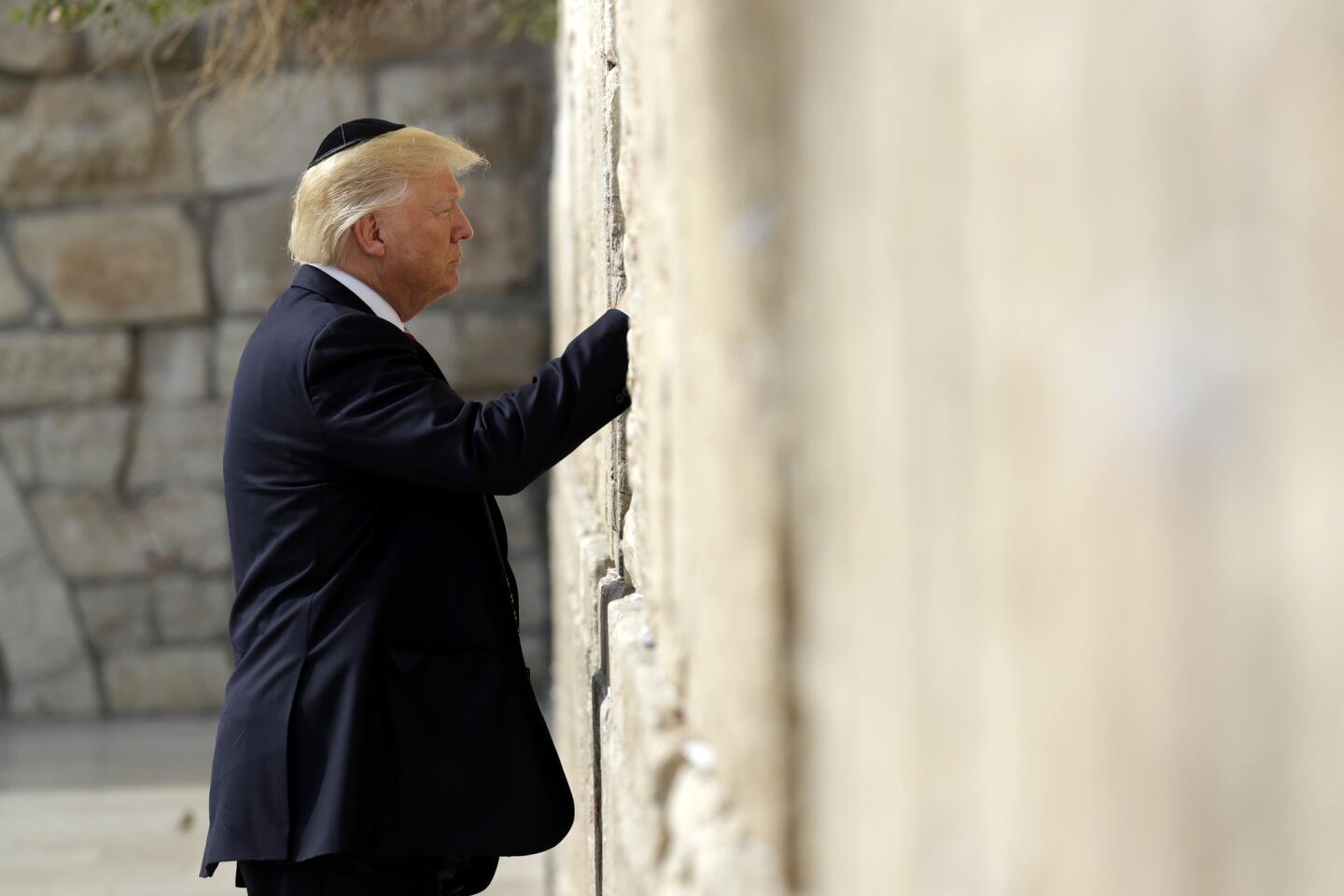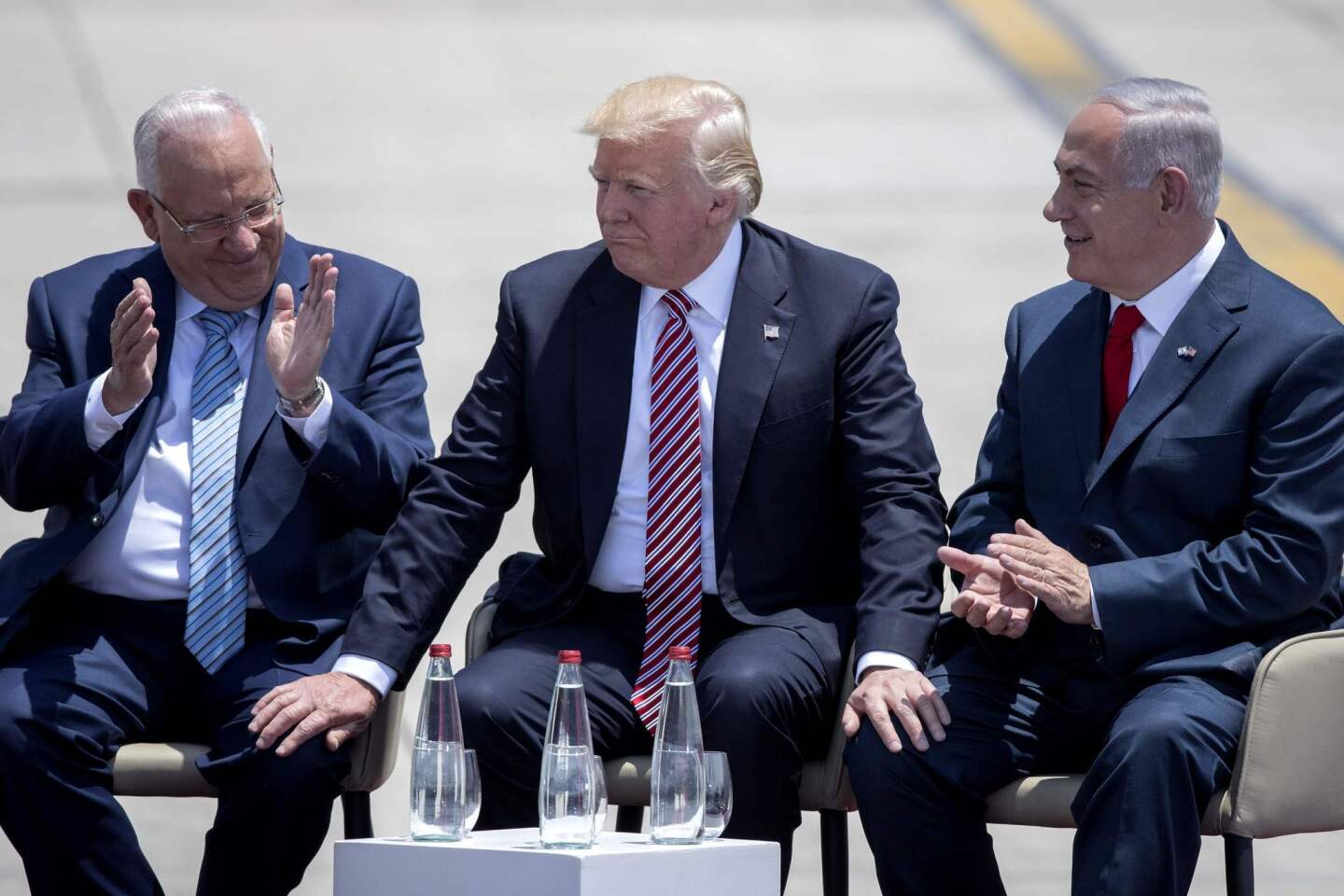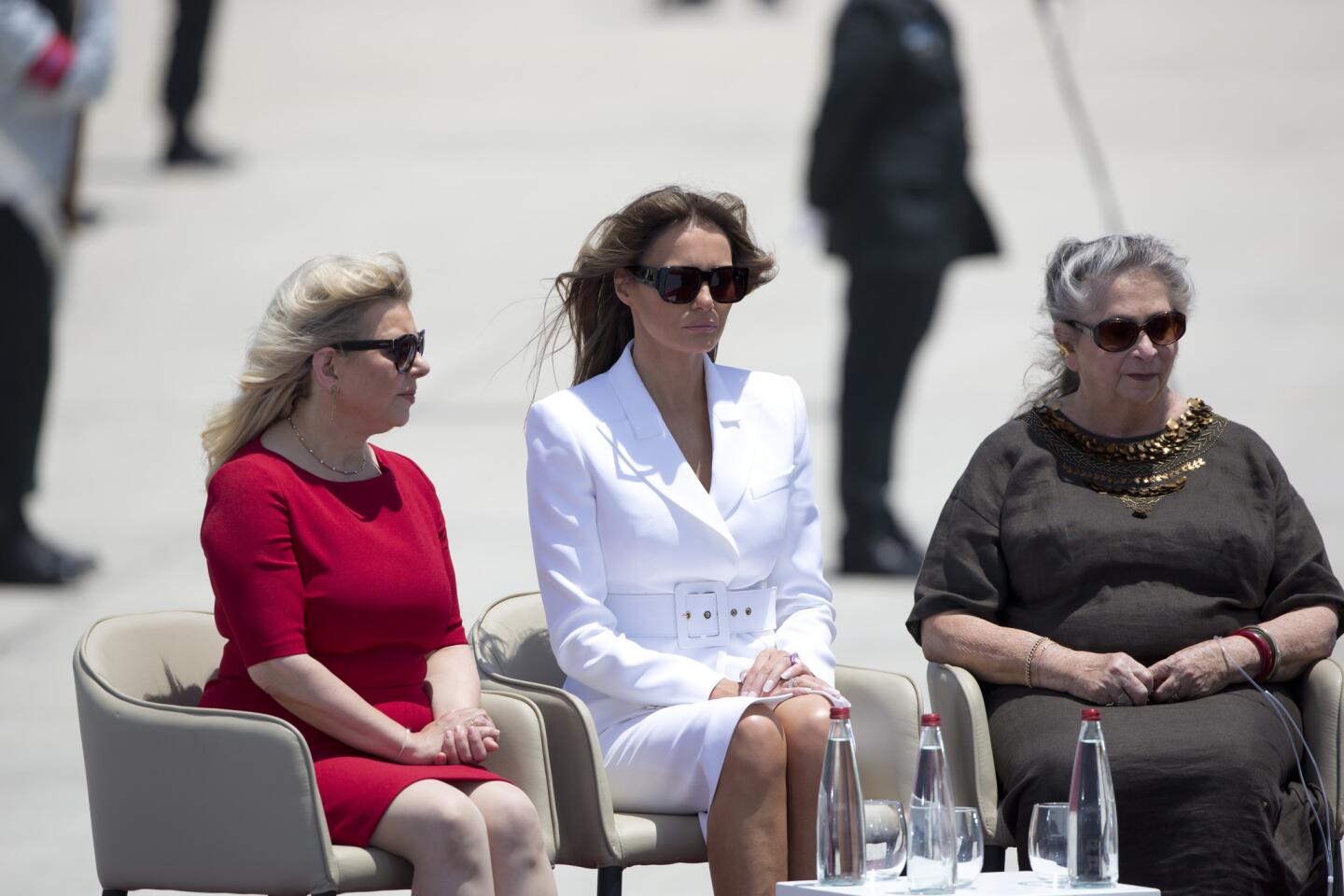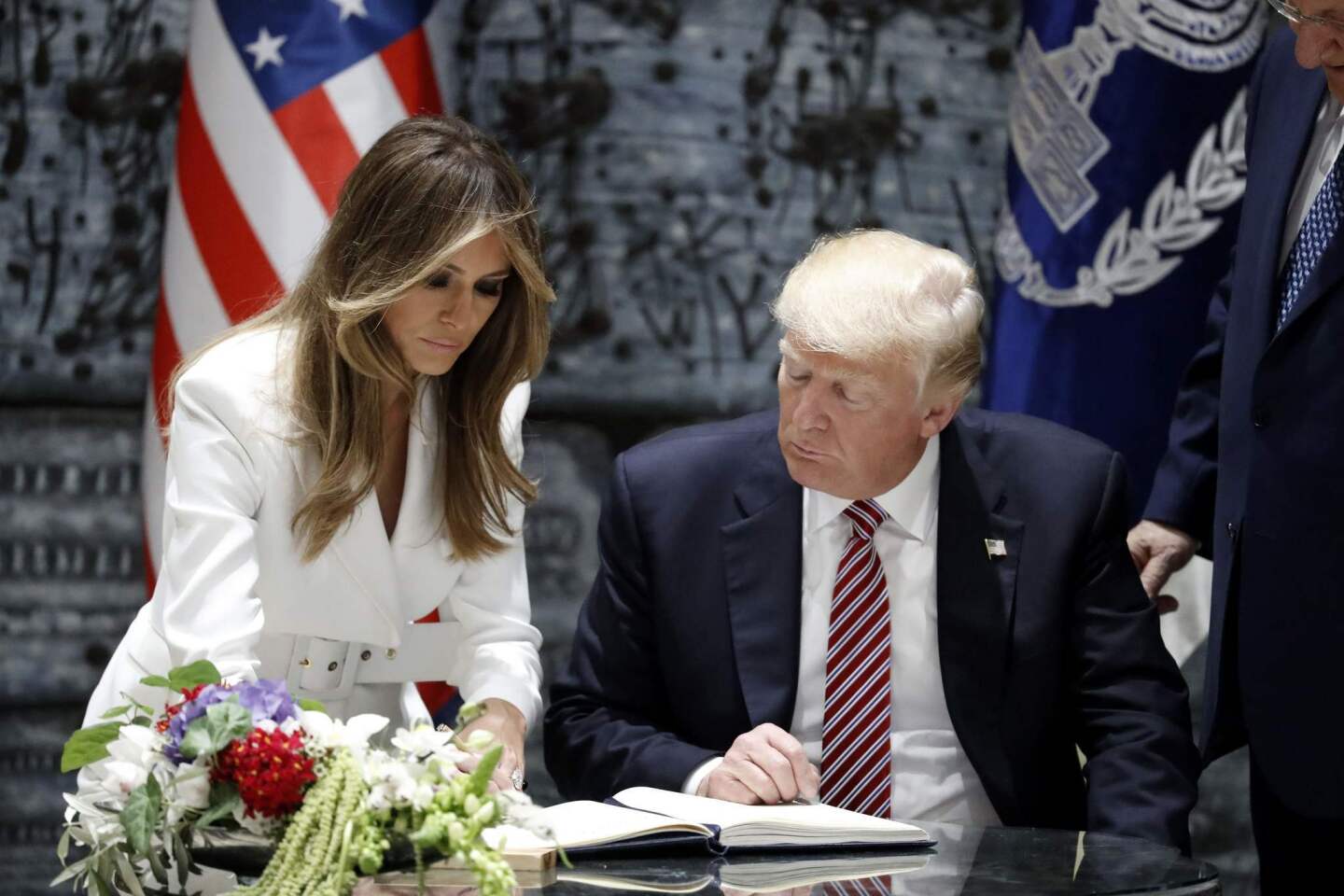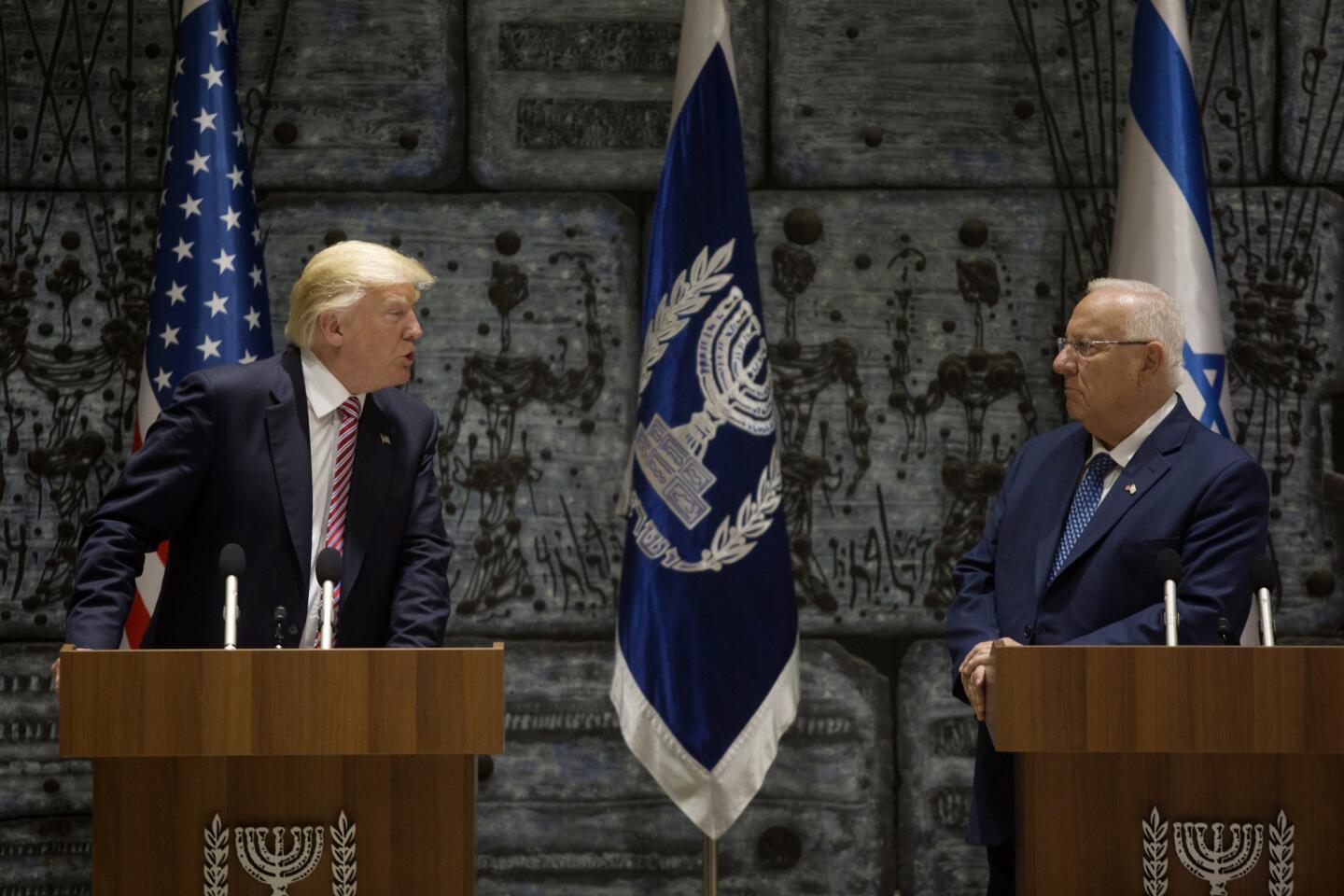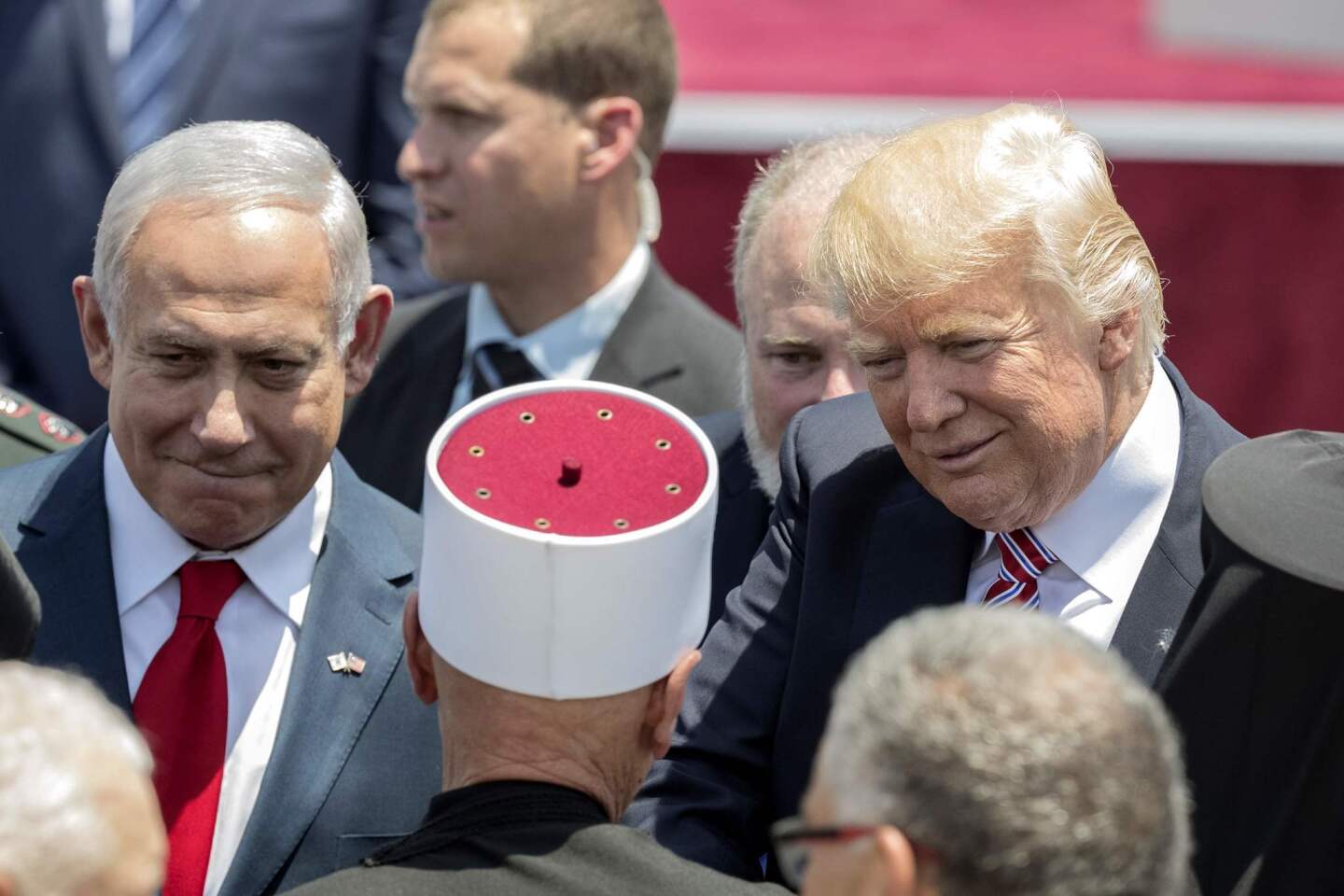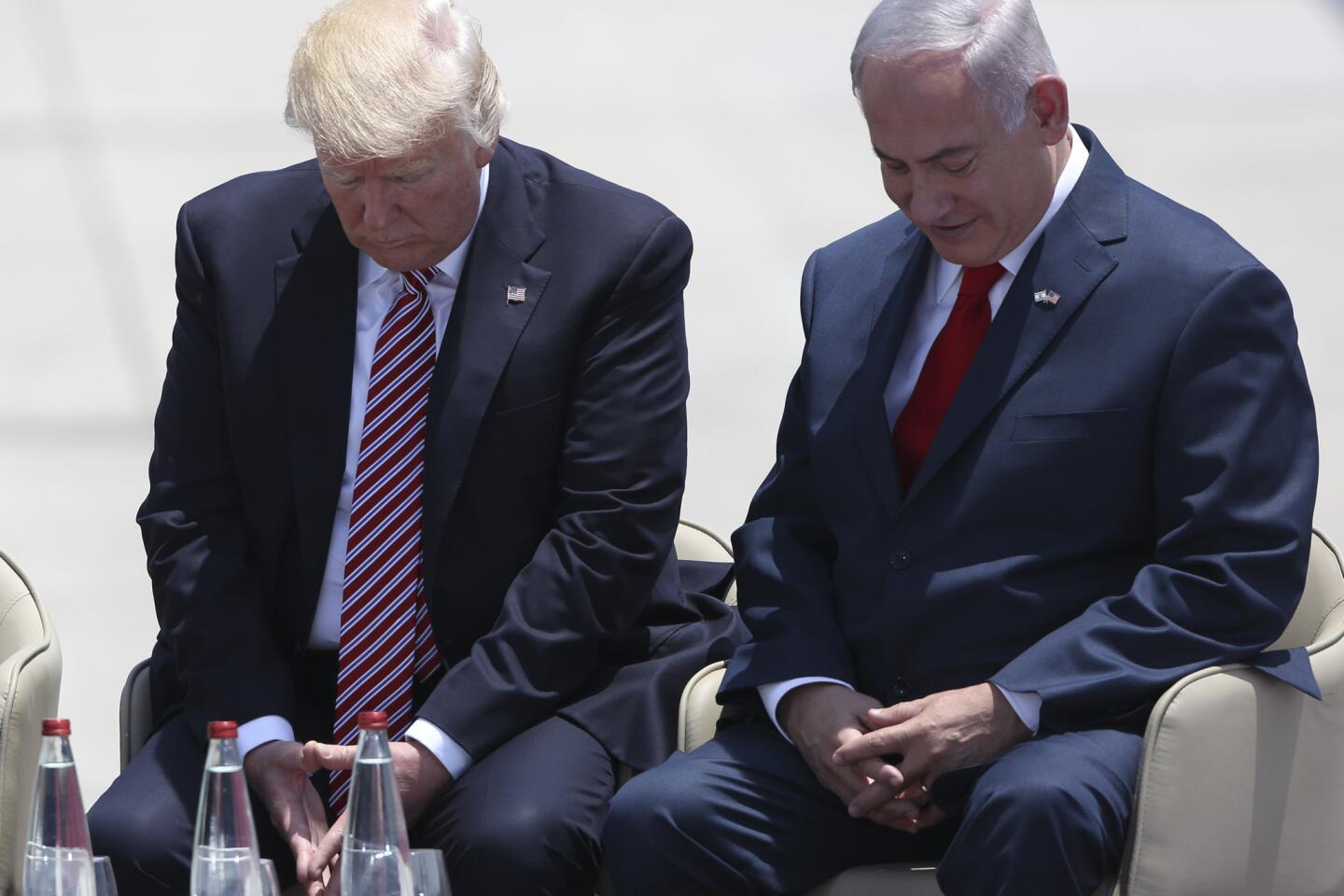Trump arrives in Israel, sparking hope of unconventional peace deal
Reporting from Tel Aviv ā In the last few years, the word āpeaceā has become something of a dirty word in Israeli politics.
In the wake of a string of unfulfilled efforts to negotiate an agreement between Israelis and Palestinians, followed by successive rounds of violent confrontations, the whole concept of shalom has come to be seen by many Israelis as naive, an idea whose time came and went.
Even the dovish Labor Party, which won major public support for peace initiatives in the early 1990s, has stopped using the word in recent political campaigns, preferring to talk instead about ādiplomatic agreementsā and a goal of āseparationā from the Palestinians.
But President Trumpās visit to the Middle East appears to be sparking a reassessment in Israel, both in the public and among some Israeli leaders, who see Trumpās forging of a new alliance against Iran as a possible new opening to settle a range of historic disputes.
As he arrived in Tel Aviv on Monday, Trump told Israeli leaders he had āfound new reasons for hopeā in meetings earlier on his trip with leaders of Saudi Arabia and other Arab Gulf nations, whose endorsements and leadership are key to any regionwide bridge-building.
āWe have before us a rare opportunity to bring security and stability and peace to this region and its people, defeating terrorism and creating a future of harmony, prosperity and peace, but we can only get there working together. There is no other way,ā Trump said.
Israeli Prime Minister Benjamin Netanyahu used the word āpeaceā six times in his welcoming remarks, when he talked about the U.S. presidentās trip as a āhistoric milestone on the path towards reconciliation and peaceā and envisioned a day when an Israeli prime minister would be able to follow in Trumpās footsteps between Tel Aviv and Riyadh, the Saudi capital.
āThe word āpeaceā was erased in the Israeli political dictionary by this government coalition. The visit is bringing the word peace back to the lexicon,ā Alon Liel, former director general of Israelās Foreign Ministry, said of Trumpās foray through the region.
For years, U.S. diplomats have tried to forge peace in the Middle East by leveraging alliances with Gulf Arab states, but only now as they face the specter of an emboldened Iran are Arab leaders uniting behind a new effort by Trump to build an alliance against the aggressive Shiite theocracy on the other side of the Persian Gulf.
In a meeting with Israeli President Reuven Rivlin on Monday, Trump noted that in Saudi Arabia, āWe were treated incredibly well, with a good feeling toward Israel.ā
āWhatās happened with Iran has brought many of the other parts of the Middle East toward Israel, and you could say that if thereās a benefit, that would be the benefit,ā Trump said. āIāve seen such a different feeling toward Israel from countries that, as you know, were not feeling so well about Israel not so long ago. Itās brought a lot of folks together.ā
If there is a renewed sense of optimism, however slight, some of it is due to changing attitudes in the Arab world about the possibility of partnering with Israel.
āIf you go out on the street and ask Saudis who is your enemy, Israel or Iran? Theyāre going to say Iran,ā said Ahmed Alibrahim, a businessman in Riyadh. āItās time to align together. We have so much in common with the Jewish people and less differences: a common threat from Iran, ISIS, stabilizing Syria, getting rid of Hezbollah and establishing economic stability in the region.ā
Saudi officials expressed hope during Trumpās two-day visit that gulf states can take a leading role in brokering peace with the new U.S. administration. Both Trump and his son-in-law, Jared Kushner, an Orthodox Jew, have their sights set on a peace deal.
The notion of recruiting Arab countries to help craft an agreement between Israelis and Palestinians ā known as the āoutside-inā approach ā is not new. James A. Baker III, secretary of State under President George H.W. Bush, organized the first regional conference in 1991 with Israelās prime minister and Arab leaders. President George W. Bush held a summit for Israeli and Arab leaders in Annapolis, Md., in 2007. And President Obamaās special envoy, George Mitchell, tried to enlist Arab officials in 2009.
Now many see conditions ripe for such a partnership. The Israeli government has offices in Egypt, Jordan and the United Arab Emirates, and in Saudi Arabia, there have been back-channel communications between the two governments.
Most television channels and pan-Arab newspapers ā owned by Saudis, Qataris and Emiratis ā have replaced the specter of āIsraeli aggressionā with āPersian aggression.ā
This month, Hamas leaders put out an important new policy statement, softening their stance on Israel and accepting the idea of a Palestinian state in territories occupied by Israel in the Six-Day War of 1967.
Israel has shared Sunni Arab nationsā mounting anxiety over Iranās expanding influence, and this has opened new possibilities for a discreet alliance.
This unlikely partnership gained momentum with the rise of Saudi Arabiaās powerful young deputy crown prince, Mohammed bin Salman, a Trump supporter who has been among the chief proponents of Saudi Arabiaās intervention against Iranian-backed fighters in nearby Yemen. The prince and other Saudi officials met with Trump this weekend, and many Saudis said later that the successful visit ā which included a $110-billion arms sale to the Saudis ā heralded a strengthening partnership.
Michael Oren, an Israeli deputy minister for diplomacy and a former ambassador to the U.S., said Israel and the Gulf share the same approach to Iran, Syria and the militant group Islamic State.
āToday, Israel and the Sunni Arab states have a greater confluence of interests than at any time since Israelās creation,ā he said. āNot only do they not view Israel as an enemy, they view Israel as an ally, as an asset ā even though they wonāt say so publicly.ā
Oren suggested that Israel would be willing to make politically difficult concessions to the Palestinians if the Saudis and other gulf states were willing to establish more overt ties with Israel.
āIn return for a concrete offer from the Arab world, we could do things for the Palestinians that are difficult for us internally. It would be a mistake for anyone to think that we can have a relationship with the Sunni Arab world without making concessions. We have to take them seriously,ā he said.
Oren said Israeli officials consider the Arab Peace Initiative, often called the Saudi initiative, the framework for a prospective peace deal. It calls for normalizing relations between the Arab world and Israel in exchange for Israelās withdrawal from the occupied territories (including East Jerusalem) and a ājust settlementā for Palestinian refugees under terms established by a United Nations resolution.
Netanyahu has expressed tentative support for the initiative ā with caveats, including rejecting calls for Israel to withdraw from the Golan Heights and to accept millions of Palestinian refugees.
If Trump can prod Saudis and Israelis into even a tentative agreement, it would be a foreign policy coup, said Joshua Teitelbaum, an expert on Saudi Arabia and the Gulf at the Begin-Sadat Center at Israelās Bar-Ilan University.
āSome sort of announcement of raising the level of relationship between these former enemies, that would be a foreign policy achievement for him,ā Teitelbaum said.
Some analysts were still skeptical that an āoutside-inā approach is possible given the Palestiniansā infighting and their non-negotiable demands. Fatah leader Marwan Barghouti, 57, a unifying figure who many saw as a successor to aging Palestinian leader Mahmoud Abbas, 82, remains jailed for murder in an Israeli prison, where he and scores of others staged a hunger strike this year.
āEven if the Arab states would like to do what Trump wants them to do, they cannot do it because there are certain red lines in terms of exerting pressure on Abbas to accept anything less than a durable Palestinian state with its capital in East Jerusalem,ā said Fawaz Gerges, a professor of international relations at the London School of Economics.
Khaled Maeena, former editor of the Saudi English-language Arab News and Saudi Gazette, said some would not accept a partnership with Israel so long as there are Israeli settlements in the West Bank.
āFor me to do business with an Israeli company, Iām a liberal and secular person, and I will not do it. Israel is an occupying country,ā Maeena said. āThere has to be a red line and we cannot capitulateā¦. We want friends, not masters. We want America to be a force of good, not a colonial power.ā
He noted that after Anwar Eshki, a former Saudi general who became a businessman, traveled to Israel last year, he was ālampooned and buffooned.ā
Eshki said he responded to an invitation from Palestinian authorities to explain the Arab Peace Initiative to Israeli diplomat Dore Gold, members of the Arab parliament and Israeli Knesset.
āIt was an effort to bring common understanding and peace to this conflict,ā Eshki said, stressing that he does not represent the Saudi government and his visit didnāt signal normalized relations between the countries.
āWe do agree with Israel that Iranian people are decent, yet their regime is inadequate and their main goal is destructive whether their leadership is conservative or liberal,ā he said.
Eshki and others here expect Trump to soon announce a new military alliance of Arab nations, a āNATO of the Middle East,ā that could further ally them with Israel against Iran and its proxies āto ensure stability in the region.ā
Hennessy-Fiske reported from Riyadh, Joshua Mitnick reported from Tel Aviv
More to Read
Sign up for Essential California
The most important California stories and recommendations in your inbox every morning.
You may occasionally receive promotional content from the Los Angeles Times.
